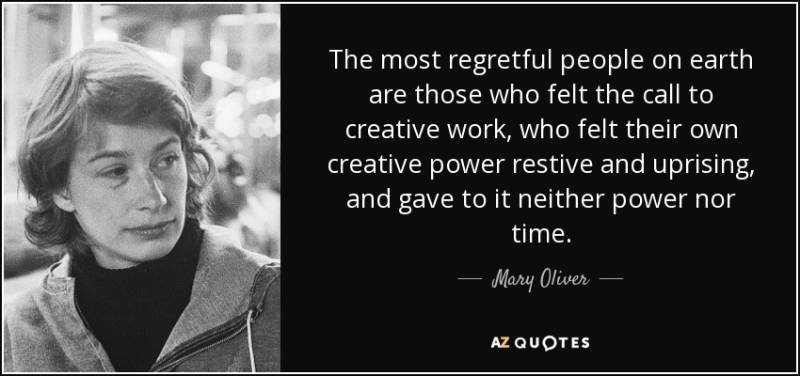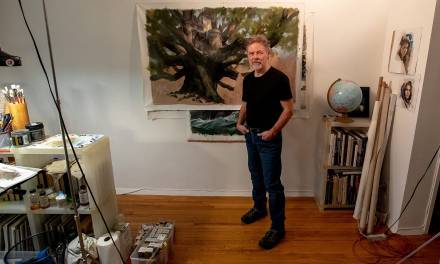As creatives develop through their career, we gather influences. Some influences are short-lived — personal trends that catch our eye for a moment and are discarded — and some are long-lasting. The longest lasting become kind of a council in our mind. Work that you can go back to again and again and get new insights out of. I think we can all name a number of artists that make up this special curated garden for us. Many of us do the same with authors. There are people I have never met but who I consider as important an influence on my mind and philosophy as the therapist I see every week. If you go back through my Muddy Colors posts, you can easily see some names repeat again and again — Joseph Campbell, Carl Jung — and I’d like to highlight another today: Mary Oliver.
I go back to Mary Oliver when I’m feeling especially burned out & feeling bruised by our productivity cult of a culture. She’s a poet and essayist who writes a lot about the creative process and the worth of creative work for its own sake. I find her especially healing when I have been completely burnt out by being creative on demand for work and can’t find two creative brain cells left to rub together for myself. I think the only time I’ve name dropped her here before is in the article about the Envy of Non-Creatives.
I think that’s a great quote, but I picked up her collection Upstream again recently, which has the essay (“Of Power and Time”) that quote is from, and I was reminded how strong that whole section of the book is. I’m going to share some more points here, and if you’re struggling with burnout, and over focusing on the product instead of the process, give her a read.
These are excerpts from that essay “Of Power and Time” but I definitely recommend the entire book as a mental cleanser, especially if you are a nature person. Later in the book she talks about her own council of influences, and it’s very heavy on folks rooted in nature (Whitman, Emerson) and the healing we can find in nature. However, if you find yourself as inspired by the sounds of a busy city around you as much as the sound of a forest, don’t worry, the metaphors translate seamlessly.
Creative work needs solitude. It needs concentration, without interruptions. It needs the whole sky to fly in, and no eye watching until it comes to that certainty which it aspires to, but does not necessarily have at once. Privacy, then. A place apart — to pace, to chew pencils, to scribble and erase and scribble again.
But just as often, if not more often, the interruption comes not from another but from the self itself, or some other self within the self, that whistles and pounds upon the door panels and tosses itself, splashing, into the pond of meditation. And what does it have to say? That you must phone the dentist, that you are out of mustard, that your uncle Stanley’s birthday is two weeks hence. You react, of course. Then you return to your work, only to find that the imps of idea have fled back into the mist.
She reflects:
That the self can interrupt the self — and does — is a darker and more curious matter.
And then goes on to talk about how humans hold multiple selves within them — our inner child, our self at our job, our self with our friends, our self with our family — and how strange it is that these selves can not only have dialogue within us but also argue! (We’ve all been there, right?) But more importantly for our purposes here on Muddy Colors, she talks about how artists (and by that she means anyone who creates — authors, painters, musicians, etc) have what she calls a Third Self:
In creative work — creative work of all kinds — those who are the world’s working artists are not trying to help the world go around, but forward. Which is something altogether different from the ordinary. Its labor requires a different outlook — a different set of priorities. Certainly there is within each of us a self that is neither a child, nor a servant of the hours. It is a third self, ocassional in some of us, tyrant in others. This self is out of love with the ordinary; it is out of love with time. It has a hunger for eternity.
Intellectual work sometimes, spiritual work certainly, artistic work always — these are the forces that fall within its grasp, forces that must travel beyond the realm of the hour and the restraint of the habit. Nor can the actual work be well separated from the entire life. Like the knights of the Middle Ages, there is little the creatively inclined person can do but prepare himself, body and spirit, for the labor to come — for his adventures are all unknown. In trust, the work itself is the adventure.
I could sit here and copy the entire essay if I get going, but I’m hoping that if these words appeal to you — if you feel like you’ve lost the path of why you create and find you need a bit of a reminder why you started making things in the first place — you’ll find this essay and read it for yourself. I think it’ll help you too.
My responsibility is not to the ordinary, or the timely. My loyalty is to the inner vision, whenever and howsoever it may arrive.
There will be a hundred days without mustard. The poem gets written.









Thanks for indication. The other article had been very important to me. I have already set the book aside to read.
Always love your articles. They are thought provoking in all sorts of directions. The talk of multiple selves is very reminiscent of IFS, which I’m guessing through your therapy forays you are likely familiar with.
Cheers!